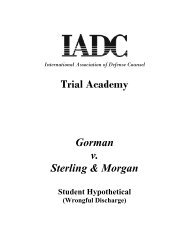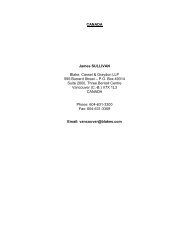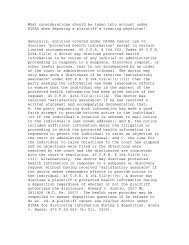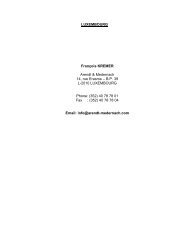Defense Counsel Journal - International Association of Defense ...
Defense Counsel Journal - International Association of Defense ...
Defense Counsel Journal - International Association of Defense ...
Create successful ePaper yourself
Turn your PDF publications into a flip-book with our unique Google optimized e-Paper software.
Page 500 DEFENSE COUNSEL JOURNAL–October 2012federal law duty to keep the labelthe same. 13In so finding, the Court explainedthat, “[w]hen the ‘ordinary meaning’ <strong>of</strong>federal law blocks a private party fromindependently accomplishing what statelaw requires, that party has establishedpre-emption[,]” rejecting an argumentthat the generic pharmaceuticalmanufacturers had the ability to workwith the FDA to have the brand-nameproduct’s (and thus the genericproduct’s) label changed. 14 Specific tothe situation <strong>of</strong> generic pharmaceuticalmanufacturers, the Court statedthat“[b]efore the [genericpharmaceutical m]anufacturers couldsatisfy the state law, the FDA – afederal agency – had to undertake aspecial effort permitting them to do so.To decide these cases, it is enough tohold that when a party cannot satisfy itsstate duties without the FederalGovernment’s special permission andassistance, which is dependent on theexercise <strong>of</strong> judgment by a federalagency, that party cannot independentlysatisfy those state duties for preemptionpurposes.” 15The Court recognized thedivergence between its decision inMensing and its 2009 holding in Wyethv. Levine that found no pre-emption forbrand-name pharmaceuticals. Inexpressly pointing out the differenttreatment accorded to what arechemically the same products, the Courtrecognized that its holding in Mensing13 Id. at 2578.14 Id. at 2580.15 Mensing, 131 S. Ct. at 2580-2581.may “make[] little sense” to Plaintiffs. 16The Court explained that the differentoutcomes were based on the differentregulatory treatment <strong>of</strong> the twocategories <strong>of</strong> pharmaceuticals, whichresulted from the legislative choice toregulate generic drugs differently to“bring[] more drugs more quickly andcheaply to the public.” 17 The SupremeCourt has not addressed pre-emptionand generic pharmaceuticals since.The application <strong>of</strong> Mensing bylower courts has not been consistent.Most notably, lower courts are dividedon whether Mensing strictly applies t<strong>of</strong>ailure to warn claims or if it extends tocause the pre-emption <strong>of</strong> design defectclaims against manufacturers <strong>of</strong>generics, and that split continues todevelop. For example, the First Circuitin Bartlett v. Mutual Pharmacy, foundthat design defect claims were notpreempted, reasoning that the genericpharmaceutical manufacturer had achoice not to make the product at all: “ageneric maker can avoid defectivewarning lawsuits as well as designdefect lawsuits by not making the drug;and while PLIVA is itself a limiteddeparture from a general rule <strong>of</strong> Wyeth,an extension <strong>of</strong> PLIVA to design defectclaims would comprise a general rulefor generics (although not one PLIVAexpressly adopted).” 18 In so finding,the court stated that only the SupremeCourt can decide whether the Mensing16 Id. at 2582.17 Id. at 2582.18 Bartlett v. Mutual Pharm. Co., Inc., 678F.3d 30, 38 (1st Cir. 2012). On July 31,2012, Mutual Pharmaceutical Companypetitioned the Supreme Court for a writ <strong>of</strong>certiorari.












